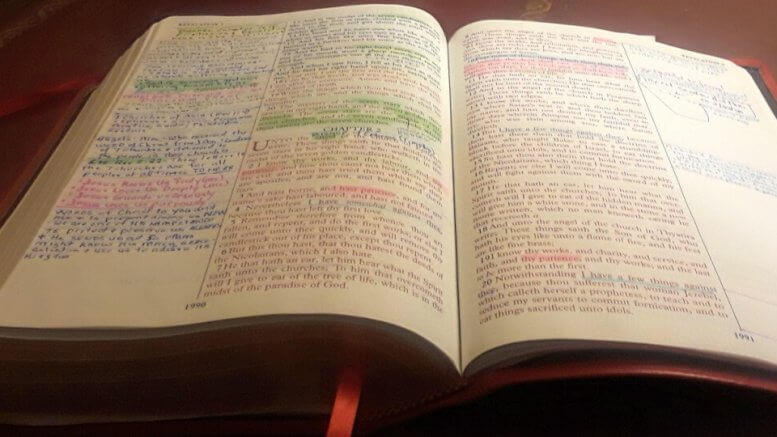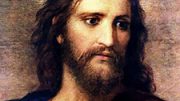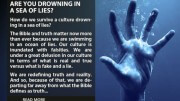Irrefutable Proof that Joseph Smith Was a Fraud: Why Mormonism is Not Christian
One of the most prolific spiritual signs of the end times that point to the soon return of Jesus Christ involves the increasing appearance of false christs and their cults (Matthew 24:5,11,24). A cult is a counterfeit religion that practices deception to present a likeness to the original. Adherents claim to be genuine Christians while redefining biblical doctrines involving God, Jesus, and salvation to reduce their chances of detection and increase being accepted as authentic Christianity.
One of the most notorious and successful of these religious counterfeiters was Joseph Smith, Jr. (1805-1844), founder of the Church of Jesus Christ of Latter-Day Saints (LDS), better known as the Mormons. With nearly eight million followers today, the LDS Church continues to grow at an exponential rate, even some 180 years after Smith’s death.
However, the cult of Mormonism stands precariously like a house of cards, easily toppled by two simple and unarguable facts: Smith’s immoral character and his many false prophecies. To know what these are is to gain spiritual discernment and so not be duped by a false christ “masquerading as an angel of light” who was in truth a “false apostle and deceitful worker” (2 Corinthians 11:3-4,13-14).
Smith’s Immoral Character
Many historically documented accounts of Joseph Smith’s character demonstrate a lifestyle of immorality and debauchery that lie in stark contrast to the biblical man who lives in holiness and obedience to sound biblical doctrine.
Smith’s own testimony reveals him to be a serial liar. He claimed at the tender age of 15 to have been visited by “two glorious personages surrounded with a brilliant light which eclipsed the sun at noonday,” whom he identified as “the Father and the Son.” God Himself supposedly taught young Smith to despise Christian creeds, consider denominations as abominations, and believe that the Bible had been corrupted and so in need of restoration.
Three years later, Smith next claimed that an angel named Moroni directed him to a hill called Cumorah near the village of Manchester, New York to find hidden golden plates. There he would also find the Jewish high priest’s Urim and Thummin stones, and by looking through these stones, he could translate the plates from ancient Egyptian hieroglyphics into English. Coincidentally, Smith just happened to find these artifacts right near his home.
To substantiate his discovery, Smith deviously qualified three witnesses — Oliver Cowdery, Martin Harris, and David Whitmer — as those who could testify to the existence of the plates while Smith kept them out of sight from the world during his time translating. Nobody but these four could have viewed the plates, for Smith revealed that the angel Moroni had conveniently returned and delivered them back up to Heaven before anyone else could have a look. These witnesses’ wretched moral character makes their testimonies completely dismissible. Both Whitmer and Cowdery were later charged by their fellow Mormons as thieves and counterfeiters, and Harris eventually admitted that he never had really laid eyes on the plates, but instead gazed upon them through his “eyes of faith.”
What Smith claimed to have translated were the written words of a man named Mormon who had been a descendant of a Jewish exilic pilgrim to the New World named Lehi. Once Smith had finished “translating” the golden plates into the Book of Mormon, he then revealed that John the Baptist had appeared to him to ordain him into the Aaronic priesthood. Now commissioned, Smith launched his new religion — Mormonism — on April 6, 1830, and quickly began amassing followers from people who had become disenfranchised by traditional Christianity.
When it came to leading his new followers, Smith behaved more like a gang leader than a shepherd of God. Anyone who spoke out against Smith’s false teachings was attacked with a vengeance. In one historic account, Smith hired two Mormons to kill a man who had been outspoken against his teachings. In another historic account, Smith claimed he had a vision from God that told him that “the redemption of Zion must come by power,” and so amassed an army of 200 Mormons to march on Independence, Missouri, where he was summarily routed. Smith’s army, called the Danites, was described as “a band of murderers whose vile misdeeds were later written in blood on the blackest pages of the history of Mormonism.” Because of their treasonous actions, Missouri Governor Lilburn W. Boggs ordered General Clark to treat the Mormons as enemies who “must be exterminated or driven from the state, if necessary, for the public good” for “their outrages are beyond description.” Porter Rockwell, chief of the Danites, was described as “a powerful man physically, with a mind of narrow perceptions, intense convictions, and utterly depraved motives,” who had been charged with close to one-hundred cold-blooded murders.
Polygamy and pedophilia also demonstrated Smith’s contempt for God’s moral law, especially Genesis 2:24 which defines marriage as being between one man and one woman for life. Smith claimed divine revelation to justify his acts of polygamy, having amassed a collection of some 33 known wives, some as young as 14 years old. This lurid behavior led the townsfolk of Kirtland, Ohio to tar and feather Joseph Smith and his friend, Sidney Rigdon. Polygamy so defined early Mormonism that Smith’s successor, Brigham Young, even went as far as blasphemously claiming Jesus Christ was a polygamist who had been married to Mary and Martha, the sisters of Lazarus, as well as to Mary Magdalene.
Wherever Smith and his followers went they sowed discord and violence, even among themselves, eventually causing the Mormons to be forced out of Ohio, then Missouri, settling in Illinois, before later finally being pushed west into Utah. While in Illinois, Smith ordered his followers to burn down the Nauvoo Expositor newspaper for publishing the horrors of Mormon rule and practice. This act of arson led to Joseph Smith’s arrest. An angry mob stormed the jail where he was being held and shot Smith and his brother Hyrum. For supposedly being a divinely appointed prophet of God, Smith died like the criminal he was on June 27, 1844.
For all of his supposedly divine proclamations, Smith proved to be a lying, thieving, violent, sexually immoral miscreant who clearly did not live a life as the Apostle Paul preached, “worthy of the Lord, fully pleasing Him, being fruitful in every good work and increasing in the knowledge of God” (Colossians 1:10).
Smith’s Many False Prophecies
The LDS Church made the following admission concerning their founder’s personal claim of being a divinely appointed prophet of God:
By nearly three million persons in many lands, Joseph Smith is today held in remembrance as a Prophet of God. The virtues and achievements of his followers stand as a monument to his divine calling. The Church of Jesus Christ of Latter-day Saints has its foundation in the revelations he received, the sacred truths he taught, and the authority of the priesthood restored through him.
Within this foundational LDS statement lies Mormonism’s “Achilles’ heel” in that the authority of the Mormon priesthood and the validity of their doctrines rest entirely on Joseph Smith’s claim to be an inspired prophet of God. That means that should Smith have ever pronounced any prophecy that turned out to be false, he would end up violating Moses’ litmus test of 100% accuracy in determining whether a message had been truly spoken by the Lord or not (Deuteronomy 18:21-22). Mormonism’s own Articles of Faith admits to as much stating, “If his [Smith’s] claims to divine appointment be false, forming as they do the foundation of the Church… the superstructure cannot be stable.” Cold Case Christianity author J. Warner Wallace proves the superstructure to indeed be very unstable by providing just a few of the many false prophecies made by Joseph Smith which prove that he had indeed failed Moses’ test:
1. Joseph Smith made open-dated prophecies, such as when he predicted in 1835 that, “The coming of the Lord, which was nigh — even fifty-six years should wind up the scene” (History of the Church, Vol. 2, 182).
2. He made several self-fulfilling prophecies, such as when he claimed the Lord instructed him not to translate any more until he had arrived in Ohio. (D&C 37:1).
3. Smith made conditional prophecies, such as when he stated that if the people of Ohio repented they would not be severely judged by the Lord (D&C 40:16-18).
4. Smith even went as far as to make close-dated, unconditional prophecies, such as when in 1832 he prophesied that an LDS temple would be built in Independence, Missouri within his generation. Almost 200 years later, no temple has ever been built, especially during Smith’s generation, forcing the LDS leadership to admit this prophecy never came true. (D&C Section 84).
5. Smith also made several fanciful prophecies, such as when in 1837 he proclaimed that the Lord had told him that the moon was inhabited by men and women who looked like the people of the earth, that they lived up to a thousand years old, stood nearly six feet tall, and dressed uniformly like Quakers (The Oliver B. Huntington Journal, 1881).
Conclusion
It takes little effort to prove that Joseph Smith’s claim to being a divinely called prophet of God was fraudulent. First, Smith’s own ungodly and immoral character would cause even the most ardent hedonist to blush. Second, his failed prophecies fall well short of Moses’ test in determining a false prophet.
Many more pieces of evidence could be presented that discredit Mormonism. For example, Smith obviously plagiarized the Book of Mormon from other sources such as the Bible as well as a novel written earlier by a minister named Solomon Spaulding. Some 3,000 “revisions” were made to Joseph Smith’s writings by the LDS church over the subsequent decades. The many historic and linguistic claims Smith made were in time proven to be utterly fictitious, if not ludicrous. The evidences go on and on. Such plentiful arguments should cause Mormons to express serious doubts as to the legitimacy of their false religion and so stop them from walking blindly down the steps leading away from God.
As Evangelical Christians, we must reach out to Mormons in love while armed with the sword of the Word and these facts which prove Joseph Smith was a fraud. In doing so, we confirm that Mormonism cannot be a valid expression of Christianity but rather remains as another wide road that lures lost souls to eternal separation from God in a place of torment.
References
Bjornstad, James. Counterfeits at Your Door. Glendale, CA: G/L Publications, 1979.
Boyd, Robert Frederick. “Bible and Modern Religions, Pt 4: Mormonism.” Interpretation 10, no. 4 (October 1956): 430–46. http://search.ebscohost.com/login.aspx?direct=true&db=rfh&AN=ATLA0000648437&site=ehost-live.
Church of Jesus Christ of Latter-Day Saints, “Joseph Smith’s Testimony,” https://www.churchofjesuschrist.org/study/ensign/1972/01/joseph-smiths-testimony.
Ferguson, Charles W. The Confusion of Tongues. New York: Doubleday, Doran & Company, Inc., 1928.
Ford, Clyde D. “The Book of Mormon, the Early Nineteenth-Century Debates over Universalism, and the Development of the Novel Mormon Doctrines of Ultimate Rewards and Punishments.” Dialogue 47, no. 1 (Spr 2014): 1–23. http://search.ebscohost.com/login.aspx?direct=true&db=rfh&AN=ATLA0001985050&site=ehost-live.
Kelly, C. and H. Birney. Holy Murder. New York, NY: Minton, Balch & Co., 1934.
Martin, Tim. “The Church of Jesus Christ of Latter-day Saints,” Watchman Fellowship, https://www.watchman.org/profiles/pdf/ldsprofile.pdf.
Martin, Walter. Walter Martin’s Cults Reference Bible. Santa Anna, CA: Vision House Publishers, 1981.
Morey, Robert A. How to Answer a Mormon. Minneapolis, MN: Bethany House Publishers, 1983.
Rhodes, Ron. The Challenge of the Cults and New Religions. Grand Rapids, MI: Zondervan, 2001.
Shook, Charles Α. Cumorah Revisited. Cincinnati, OH: Standard Publishing Co., 1910.
Snowden, James H. The Truth About Mormonism. New York, NY: George H. Doran Co., 1926.
Van Baalen, Jan K. The Chaos of the Cults. Grand Rapids, MI: Eerdmans, 1938.
Wallace, J. Warner. “Can We Trust the Prophecies of Joseph Smith?,” Cold Case Christianity, https://coldcasechristianity.com/writings/can-we-trust-the-prophecies-of-joseph-smith/.





